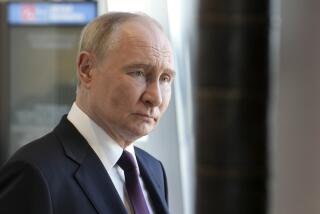No New Gorbachev Offer on Arms, Aide Indicates
- Share via
BONN — Soviet Foreign Ministry spokesman Gennady I. Gerasimov suggested here Friday that President Mikhail S. Gorbachev will not be offering any dramatic arms reduction proposals during his four-day visit to West Germany next week.
Many Western observers had predicted that Gorbachev would climax his first appearance in the Federal Republic with a new initiative on weapons or troop cuts in Europe, partly to upstage President Bush and the North Atlantic Treaty Organization in the East-West competition for Western European public opinion.
Meanwhile, Soviet Foreign Minister Eduard A. Shevardnadze arrived in East Berlin on Friday to brief and reassure East German leaders about Gorbachev’s first trip to West Germany.
In Bonn to prepare for Gorbachev’s much-ballyhooed visit, Gerasimov told a news briefing that the Soviet Union is not happy with remarks by Western officials that the Soviets should be “put to the test” in their advocacy of arms reductions in Europe.
“We’re against using words like ‘test,’ ” said Gerasimov. “We don’t like them.”
As to whether Gorbachev might counter Bush’s proposal to cut U.S. and Soviet forces in Europe to 275,000 on each side, which the President made during last week’s NATO summit in Brussels, Gerasimov declared: “There are no reasons to demand a quick response from us during Mikhail Gorbachev’s visit in Bonn.”
He was referring to statements by Bush and Secretary of State James A. Baker III that Gorbachev should give his response to Bush’s proposal during his West German trip.
Gerasimov pointed out that the Bush Administration had taken several months to complete its review of foreign and national security policy.
“We didn’t ask him to hurry up,” said Gerasimov, ignoring repeated Soviet complaints about the slowness of the U.S. review process.
At the same time, Georgy A. Arbatov, one of the Soviet Union’s most prominent expert on American affairs, said that Bush’s arms control proposals, and his call for agreement to be reached within six months to a year, could be achieved if the U.S. negotiators speeded up their tactics.
“A new way of negotiating would be to set a goal and work very quickly to get it,” Arbatov said. “The Soviet Union would be ready for this new way of negotiating.”
Another Soviet expert at the briefing, Nikolai Portugalov, said the Gorbachev visit to Bonn should be a “great ice melter.”
West German officials said the major point of the meeting will be a joint declaration of cooperation and the signing of a dozen bilateral accords in the cultural, economic, and scientific fields.
In East Berlin, Shevardnadze appeared to be selling Gorbachev’s ideas about perestroika, the Soviet reform program, to an East German government reluctant to accept the new concepts coming out of Moscow.
“Perestroika has been becoming a fashionable conversation piece in the West,” Shevardnadze told Foreign Minister Oskar Fischer. “Now and again some incorrect comparisons of one socialist country against another can be heard. We stick to the principle whereby every fraternal country can arrange socialism in its own national colors.”
Fischer replied that East Germany remained a close ally of Moscow and did not need any lessons in this regard from the West.
Although East Germany is Moscow’s leading trade partner, it has resisted the economic reforms pushed by Gorbachev, which are beginning to take hold in varying degrees in East European countries such as Hungary and Poland.
More to Read
Sign up for Essential California
The most important California stories and recommendations in your inbox every morning.
You may occasionally receive promotional content from the Los Angeles Times.













